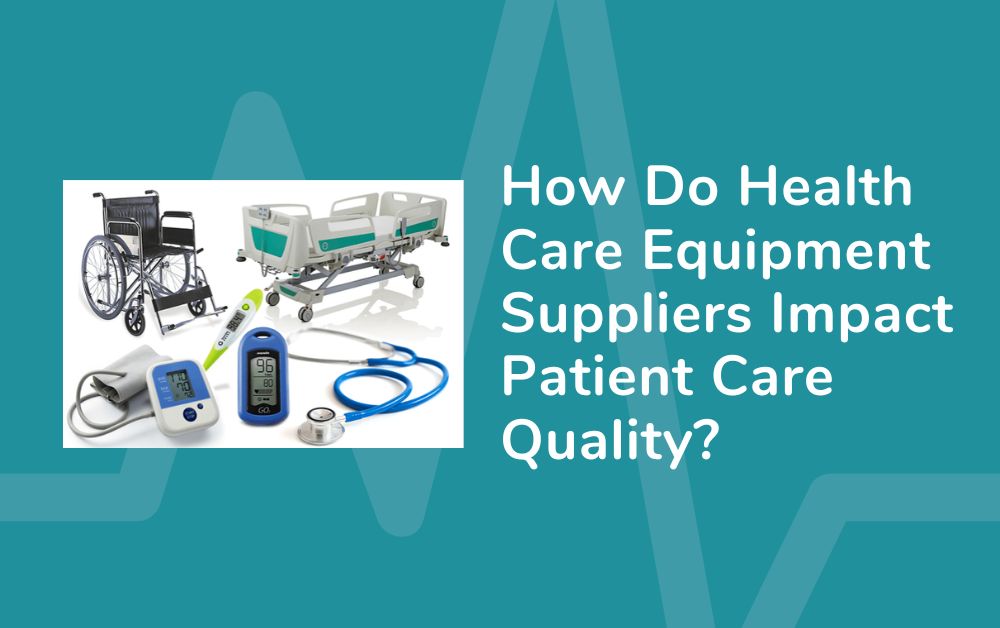
One of the fundamental factors influencing this quality is the equipment used by healthcare providers. The suppliers of this equipment play a crucial role in ensuring that healthcare facilities are equipped with the best tools to diagnose, treat, and care for patients. This blog delves into how health care equipment suppliers impact patient care quality and what healthcare providers should consider when choosing suppliers.
The Role of Healthcare Equipment Suppliers
What Do Healthcare Equipment Suppliers Do?
Healthcare equipment suppliers provide the necessary tools and devices that hospitals, clinics, and other healthcare facilities use to deliver patient care. These range from simple items like syringes and bandages to more complex machinery such as MRI machines, surgical instruments, and patient monitoring systems.
Why is Their Role Important?
The effectiveness, safety, and reliability of medical equipment directly affect the outcomes of patient care. High-quality equipment aids in accurate diagnosis, effective treatment, and continuous monitoring of patients, all of which are essential for successful healthcare delivery.
Impact on Patient Care Quality
1. Ensuring Accurate Diagnoses
The first step in treating any patient is diagnosing their condition accurately. High-quality medical equipment plays a crucial role in this process.
Precision and Reliability
- Diagnostic Tools: Equipment like X-ray machines, ultrasound scanners, and blood analyzers must provide accurate and reliable results to ensure correct diagnoses.
- Impact: Accurate diagnostic tools reduce the chances of misdiagnosis, which can lead to inappropriate treatments that might harm patients.
2. Enhancing Treatment Efficacy
Once a diagnosis is made, the next step is treatment. The quality of equipment used for treatment can significantly affect its efficacy.
Advanced Treatment Solutions
- Surgical Equipment: High-quality surgical instruments and machines are crucial for successful surgeries.
- Therapeutic Devices: Equipment used for therapy, such as physiotherapy machines and infusion pumps, must operate flawlessly to provide effective care.
3. Improving Patient Monitoring
Continuous monitoring of patients, especially those in critical condition, is vital. The data provided by monitoring equipment helps in making timely decisions about patient care.
Continuous and Reliable Monitoring
- Monitoring Devices: Tools like ECG machines and pulse oximeters need to provide accurate and real-time data to help healthcare providers react quickly to any changes in a patient’s condition.
- Impact: Reliable patient monitoring equipment reduces the risks during recovery and can save lives by providing timely alerts.
Choosing the Right Equipment Supplier
1. Quality of Equipment
When selecting a supplier, the quality of the equipment should be the top priority. High-quality equipment not only performs better but also reduces the likelihood of device failure.
Criteria for Assessing Quality
- Certifications: Look for suppliers whose products are certified by relevant authorities, ensuring they meet safety and quality standards.
- Reputation: Choose suppliers known for their quality and reliability in the healthcare industry.
2. Support Services
A good supplier does more than just sell equipment; they also provide necessary support services.
Importance of Comprehensive Support
- Installation and Training: Proper installation and training on the use of equipment are crucial for its effective operation.
- Maintenance and Repairs: Regular maintenance and timely repairs are necessary to keep equipment functioning correctly.
3. Innovation and Technological Advancement
In the fast-evolving field of healthcare, having access to the latest technology can significantly enhance patient care.
Staying Ahead with Modern Technology
- Latest Models: Suppliers who offer the latest versions of equipment can provide better diagnosis and treatment options.
- Research and Development: Suppliers committed to innovation frequently update their offerings, which can give healthcare providers a competitive edge.
The Broader Impact of Equipment Suppliers on Healthcare

Health Care Equipment Suppliers
1. Cost Management
Efficient and durable medical equipment can reduce long-term costs by minimizing the need for frequent replacements and repairs.
Economic Efficiency
- Cost-Effectiveness: Investing in high-quality equipment from reputable suppliers ensures greater durability and functionality, which translates to cost savings over time.
2. Compliance with Health Standards
Suppliers must ensure that their equipment complies with national and international health and safety standards.
Ensuring Safety
- Regulatory Compliance: Reliable suppliers adhere to strict regulatory standards, which helps healthcare facilities comply with safety regulations and avoid legal issues.
Conclusion
Healthcare equipment suppliers have a profound impact on the quality of patient care. By providing high-quality, reliable, and technologically advanced equipment, along with excellent support services, suppliers play a crucial role in helping healthcare facilities deliver effective and efficient patient care. For healthcare providers, choosing the right equipment supplier is not just a purchasing decision but a strategic one that affects the overall quality of care they can provide. Ensuring that you select a reputable and competent supplier will help enhance patient outcomes, improve operational efficiency, and uphold the highest standards of care in the healthcare industry.
Note:- For read more articles visit on bigbizstuff.